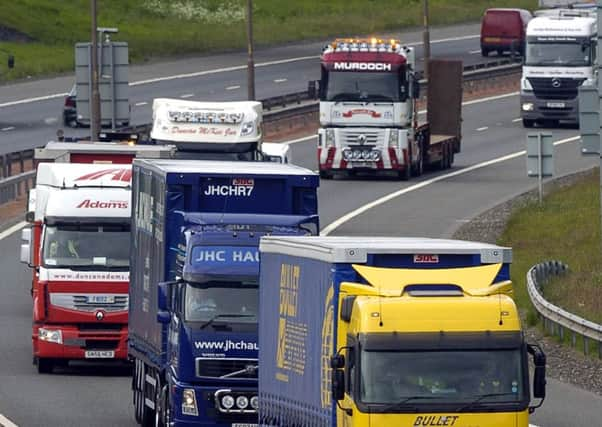Fuel duty cut is right road for next UK government


Road haulage is an essential enabler of economic growth, employment and wealth creation. Everything we eat, drink and wear depends on road haulage. We would have no homes to live in or heat to warm us without trucks and the companies and drivers that operate them. Our vehicles are seen every day – but less often understood.
Road transport is highly competitive and low margin. It is a service driven industry, responding to fluctuating customer demand. The industry is strongly IT driven and operates within the tight constraints of regulation and road conditions. Its environmental performance has been transformed, so that the latest Euro VI trucks are astonishingly clean, efficient and quiet. This is the industry that the Road Haulage Association represents – modern, innovative, clean, a substantial employer in its own right and absolutely essential to the UK economy. Its voice need to be heard.
Advertisement
Hide AdAdvertisement
Hide AdThe RHA has a full manifesto with key recommendations for the next government in Westminster, three of which are worth emphasising: driver shortage; fuel duty; and roads.
The UK faces a worsening shortage of drivers, which limits the sector’s ability to delivery a high-quality service and fuels an increasing reliance on drivers from abroad. The RHA has set out why it is both necessary and appropriate for government to make available, urgently, a straightforward, quality-based system of grants for companies towards the cost of getting drivers licensed and qualified to drive in the industry.
On fuel duty, RHA members have welcomed the decisions during the past parliament against driving up the rate of diesel duty and we believe that such strength as the economy has regained is in no small measure due to these decisions. The RHA-funded are port from the National Institute for Economic and Social Research (2012) which demonstrated that a 3p a litre permanent cut in fuel duty would significantly boost growth and jobs – and that raising duty would have the opposite effect.
However, UK diesel duty remains by far the highest in the EU. This high level of fuel duty means that one articulated truck with a single driver pays up to £14,000 more in fuel duty over a year than our near neighbours. The next government should cut fuel duty by 3p a litre to boost jobs and growth; and in any case commit to making no increase to fuel duty in the next parliament.
With regards to roads, the industry has a massive interest. The road network is where the haulage industry is at work. As with any place of work, conditions affect costs, the ability to do the job well and to attract and recruit staff. The transport industry has little influence on this working environment beyond the vehicle itself and instead looks to government to ensure the right standards are available. A nation’s road system can attract investors or deter them. Britain can be Open for Business but if our network is physically crumbling and increasingly at a standstill, investors will look elsewhere and we will fail to generate the wealth needed to pay for health and education and to eliminate the spending deficit. This principle applies not only to Scotland but throughout the UK.
The RHA proposes a vision for roads, upon which we believe most people should be able to agree. Roads should be well-built and maintained, with surfaces that are even and minimise road noise; use signalling technologies to improve traffic flow; and use information technology to ensure that road users have timely and reliable information. Truck drivers and their employers have an additional requirement – the provision of secure parking for trucks with appropriate facilities for drivers, starting with motorway services areas (MSA). It is not acceptable for crime against trucks and their drivers to be rife at MSAs or for professional drivers to be faced with poor, dirty facilities. Drivers are required to take rest breaks by law – quite apart from common sense – and MSAs are as much a part of the strategic road network as the carriageway and Smart motorway systems. Government has for too long ignored their responsibilities in this area and ministers in the next government must, as a priority, use their strong influence to ensure that appropriate secure parking facilities are provided across the network.
• Martin Reid is director of the Road Haulage Association www.rha.uk.net
• The Road Haulage Association welcomes comments and queries at [email protected]
SEE ALSO